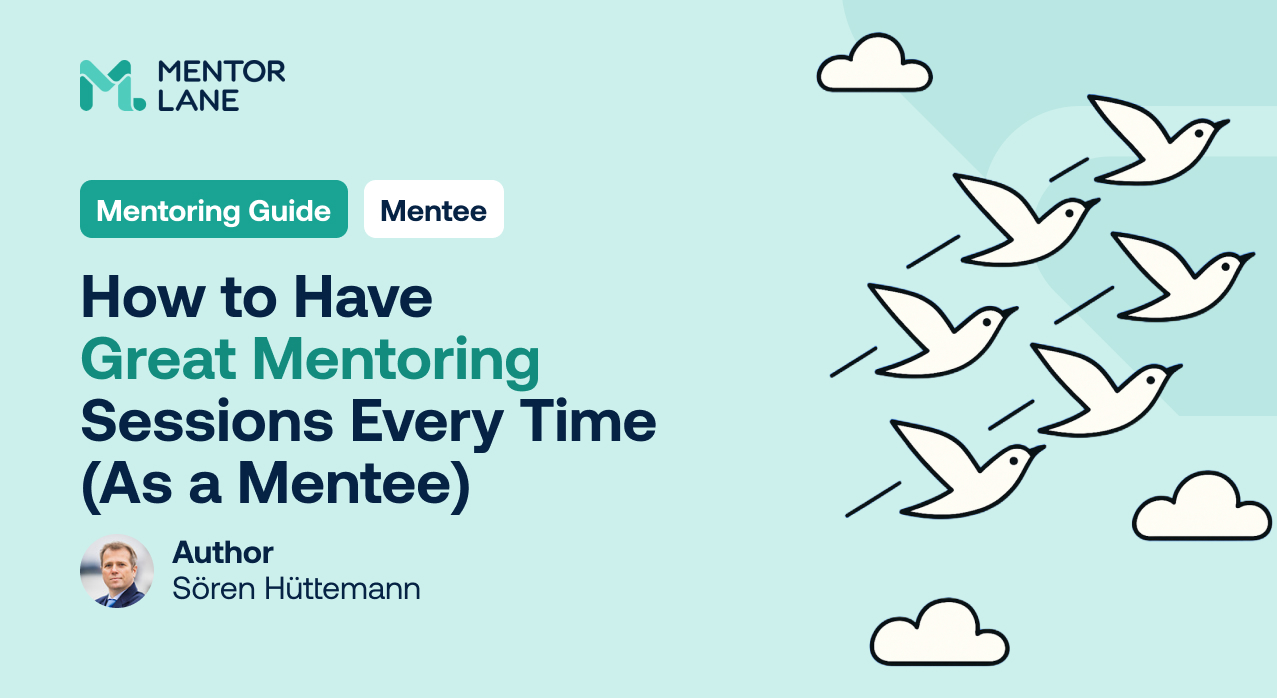News & Updates
25 Aug 12:37
4 min read
How to Have Great Mentoring Sessions Every Time (As a Mentee)
Discover how to prepare, structure, and reflect on your mentoring sessions. Learn practical strategies to take ownership and get the most from every conversation with your mentor.

Courtney Ellis
Media Manager
.jpg?locale=en)
How to Have Great Mentoring Sessions Every Time (As a Mentee)
Download Worksheet - Mentee’s Guide to Getting the Most from Mentoring.pdf
You already have something incredible to offer: your curiosity, ambition, and willingness to learn.
As a mentee, you are stepping into one of the most valuable opportunities in your career. Your commitment to showing up and making the most of this relationship will shape your progress.
But here is what many mentees discover: enthusiasm alone is not enough. The most rewarding mentoring experiences happen when you come prepared, stay intentional, and take an active role in the process.
If you have ever shown up to a mentoring session with good intentions but left feeling like the conversation could have gone deeper, you are not alone. Often, mentees miss opportunities because they are unsure how to structure their sessions.
The most successful mentees pair their drive to learn with preparation, structure, and reflection. Here’s how.
Maximise Your Mentoring Sessions
Three pillars separate good mentoring sessions from truly transformative ones:
- Strategic preparation questions
- Structured agendas
- Learning diaries
When programmes like Close the Gap Foundation moved from unstructured to structured mentoring, participant retention rose by 64%. That is the power of having a plan.
Pillar One: Strategic Preparation Questions
Before each session, take time to answer these five questions. They will help you arrive focused, ready, and confident.
- What did we discuss last time? What were the main takeaways?
This ensures you are building on previous conversations rather than starting from scratch.
2. What has happened since our last meeting?
Your recent wins, challenges, and changes set the tone for what you need guidance on now.
3. What do I most want to cover today?
Your mentor’s time is valuable. Know your priorities before you join the call or meeting.
4. What outcome would make this session a success?
Clarity leads to better results. A vague session usually means vague action steps afterwards.
5. What will I commit to doing after this session?
This keeps you accountable and shows your mentor you are serious about acting on their advice.
Tip: Write these answers down and bring them to your session so you can refer back to them.
Pillar Two: Structured Session Agendas
Your mentor may have their own format, but having a simple agenda as a mentee helps you: cover what matters most to you, keep the conversation on track and make every minute count.
A suggested structure:
- Opening and Check-In (5–10 minutes) Share a brief update on your progress since the last meeting.
- Review Previous Actions (10 minutes) Discuss what you worked on, what went well, and what was challenging.
- Main Discussion (30 minutes) Ask your most important questions. Explore challenges or skills you want to develop.
- Action Planning (15–20 minutes) Agree on next steps and set measurable, realistic goals before the next session.
- Feedback and Reflection (5–10 minutes) Ask for feedback and share what you found most useful.
- Wrap-Up (5 minutes) Confirm actions, deadlines, and the date for your next meeting.
Pillar Three: Learning Diaries
Capturing your learning after each session helps you apply it more effectively.
Take 10 minutes after your meeting to answer:
- The most important thing I learned today
- My biggest insight or ‘aha’ moment
- How I will apply this before our next session
- The challenges I expect to face
- Questions I still have
Over time, this creates a valuable record of your growth and talking points for future sessions.
The Mirror Effect
Mentoring works best when you are not just listening but also reflect back what you are learning. The way you prepare and participate will directly affect the value you gain.
Being honest about your challenges and development areas allows your mentor to give more targeted and relevant advice.
Mentee Session Preparation Checklist
Before each session, run through this quick checklist:
- [ ] Reviewed notes from the last meeting
- [ ] Written down progress updates, wins, and challenges
- [ ] Listed key topics or questions for today
- [ ] Defined what a successful session outcome looks like
- [ ] Prepared any materials, examples, or updates to share
- [ ] Planned how to capture and store insights from today’s discussion
- [ ] Confirmed next steps and any follow-up actions
Putting It into Practice
You do not have to use all three pillars from the start. Try:
- Answering the five preparation questions for your next three sessions
- Adding a structured agenda once you are comfortable
- Starting a learning diary to track insights and actions
This approach turns casual chats into a focused growth journey and makes it easier for your mentor to support you in the ways that matter most.
The Compound Effect
Structured mentorship delivers results. Mentees in formal, well-run programmes are promoted up to five times more often than those without structured support.
By taking ownership of your role as a mentee by preparing, structuring, and reflecting you create a partnership where your mentor’s guidance has maximum impact.
Your next mentoring session is an opportunity to put this into action. Arrive prepared, follow the agenda, and capture the lessons.
Small changes in how you approach mentoring can lead to significant changes in your career.

This post is also available in:
Related Posts
Sales Mentors: A 9-Round Guide to Sales Success with Michael Silberberger
Discover Michael’s 9-round guide to sales success. Learn how sales mentors help you build confidence, resilience, and lasting results.
What to Expect from a Mentor: What My Millionaire Mentor Taught Me
Curious what a millionaire mentor actually teaches? It's not about money tricks, it's mindset. Discover the surprising lessons that transformed Michael's approach to success and life.
How To Become a Mentor in Germany
Ever thought about becoming a mentor? Click here to work out if you're ready to become a mentor, and the steps to take to become a mentor in Germany.



-cd972d86.png)
